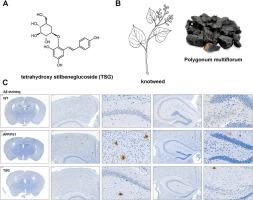Neuropeptides ( IF 2.5 ) Pub Date : 2021-09-04 , DOI: 10.1016/j.npep.2021.102197 Yan Gao 1 , Kaichao Hu 2 , Juxiang Yang 3 , Shasha Wang 4 , Juntong Li 4 , Qinglin Wu 4 , Zhenzhen Wang 5 , Naihong Chen 6 , Lin Li 7 , Lan Zhang 7

|
Alzheimer's disease (AD) is a serious, progressive neurodegenerative disease that involves irreversible neuronal death. Tetrahydroxy stilbene glycoside (TSG) is an active compound extracted from P. multiflorum, a traditional Chinese herbal medicine, but its role in neuroprotection is unclear. Herein, we aimed to validate the effects of TSG on APP/PS1 model mice and the underlying mechanism. RNA-seq was performed to identify differentially expressed genes in APP/PS1 mouse, with PCR and immunohistochemistry used for validation. Experiments were performed after bioinformatic analysis for verification. Neuronal damage was observed by H&E staining. Key proteins involved in the pathway such as CX3CR1, Iba1 and TGF-β were examined by immunohistochemical analysis. The KEGG analysis suggested that these genes might act by multiple pathways to build the pharmacological network of TSG in AD progression. These data provide the credible evidence that TSG improved neuronal damage and regulated neuroprotective mechanisms. Together, our work has detailed the whole and major genes in APP/PS1 model mouse regulated by TSG, and highlighted the anti-inflammatory function of TSG in mediating CX3CR1 and TGF-β as the TGF-β/fractalkine/CX3XR1 signaling pathway, especially in microglia. Moreover, TSG has potential value in synaptic transmission and neurotrophic action on neurodegenerative diseases. In summary, TSG is a promising candidate for preventing and treating the progression of AD.
中文翻译:

基于网络药理学的四羟基芪糖苷在APP/PS1小鼠模型中调控TGF-β/fractalkine/CX3CR1
阿尔茨海默病 (AD) 是一种严重的进行性神经退行性疾病,涉及不可逆的神经元死亡。四羟基芪糖苷 (TSG) 是一种从何首乌中提取的活性化合物,一种传统的中草药,但其神经保护作用尚不清楚。在此,我们旨在验证 TSG 对 APP/PS1 模型小鼠的影响及其潜在机制。进行 RNA-seq 以鉴定 APP/PS1 小鼠中的差异表达基因,并使用 PCR 和免疫组织化学进行验证。在生物信息学分析后进行实验以供验证。H&E染色观察神经元损伤。通过免疫组织化学分析检查了参与该途径的关键蛋白,如 CX3CR1、Iba1 和 TGF-β。KEGG 分析表明,这些基因可能通过多种途径发挥作用,构建 TSG 在 AD 进展中的药理学网络。这些数据提供了可信的证据,表明 TSG 改善了神经元损伤并调节了神经保护机制。一起,我们的工作详细介绍了 TSG 调节的 APP/PS1 模型小鼠中的全部和主要基因,并强调了 TSG 在介导 CX3CR1 和 TGF-β 作为 TGF-β/fractalkine/CX3XR1 信号通路中的抗炎功能,特别是在小胶质细胞中. 此外,TSG 在突触传递和神经退行性疾病的神经营养作用方面具有潜在价值。总之,TSG 是预防和治疗 AD 进展的有希望的候选药物。










































 京公网安备 11010802027423号
京公网安备 11010802027423号